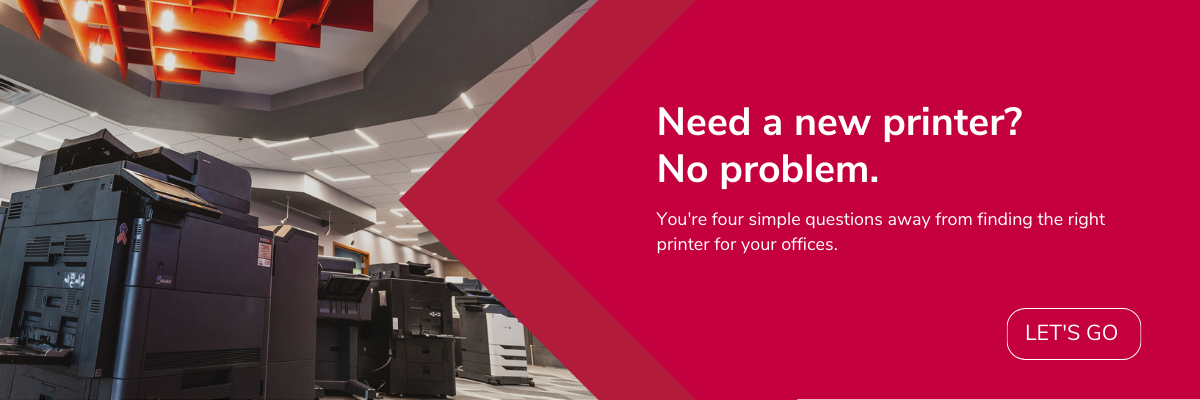Share this
Did You Know the Common Criteria Certification for Sharp Copiers Creates Uncommonly Good Security
by Kirk Studebaker // President on Feb 16, 2018 11:35:16 AM
There are three kinds of businesses:
-
Those who have been hacked and focus on security
-
Those who haven't been hacked and aren't worried about security
-
Those who have been hacked but don't know it yet
That said, how often do you think about network and document security?
If you're smart, you'll think about keeping your company information secure all the time.
Many of our customers DO think about network security and have firewall, antivirus, and network monitoring in place.
What about your copiers though?
Did you know that your copier's hard drive stores the documents that you print, scan, and copy through it?
Now think about the information on those documents – routing numbers from checks (complete with signatures!), social security numbers, credit card information, phone numbers . . . you get the idea.
A treasure trove of information that hackers would love to get their hands on.
But, it's just a copier, no one hacks copiers, right?
Wrong.
I've written about the issue of copier security recently:
Today I want to talk about the Common Criteria standard and why it's important for your security.
While companies from most manufacturers offer at least some level of security, manufacturers that have invested in testing their products against Common Criteria security standards (like Sharp) have validated their security approach via independent testing.
Before going farther, the equipment we carry from Kyocera, OKI, and Lexmark is also secure (don't think otherwise!).
What Is Common Criteria?
From techtarget.com:
“Common Criteria (CC) is an international set of guidelines and specifications developed for evaluating information security products, specifically to ensure they meet an agreed-upon security standard for government deployments. Common Criteria is more formally called "Common Criteria for Information Technology Security Evaluation."
The list of Sharp MFPs (multi-function printers, we just call them copiers) is a long one. They were certified by an independent laboratory to be compliant with Protection Profile for Hardcopy Devices 1.0.
Exact security features and capabilities will vary by model, so contact one of our experts with questions or concerns.
Many Sharp copiers have been tested to Evaluation Assurance Level 3, which is the level required for government and military offices.
Common Copier Security Vulnerabilities
Common Core standards are focused on shutting the door on a variety of vulnerabilities and issues that can hit businesses with unsecured copiers:
-
Loss of productivity
-
Loss of access
-
regulatory noncompliance
-
Lawsuits
-
Stolen information
-
Unauthorized use of equipment and network resources
Here's a sample of copier security features and what they protect you against:
-
Secure administrative passwords, IP and MAC address filtering, and user authentication prevent hackers from using copiers to access other machines on the network.
-
Hard drive data encryption and overwrite prevents stored versions of sensitive documents from being stolen.
-
Print retention and user authentication eliminates documents left unattended in paper trays, where anyone can take them.
The Sharp Security Suite offers a mix of capabilities to meet every office's information and network security needs.
Don't take copier (and printer) security for granted. Secure your devices today!
Share this
- June 2025 (1)
- March 2025 (1)
- February 2025 (1)
- January 2025 (4)
- October 2024 (1)
- July 2024 (1)
- June 2024 (4)
- May 2024 (4)
- April 2024 (4)
- March 2024 (5)
- February 2024 (4)
- January 2024 (4)
- December 2023 (1)
- November 2023 (4)
- October 2023 (4)
- September 2023 (4)
- August 2023 (4)
- July 2023 (4)
- June 2023 (5)
- April 2023 (2)
- March 2023 (1)
- February 2023 (2)
- January 2023 (2)
- May 2022 (1)
- April 2022 (3)
- March 2022 (1)
- February 2022 (1)
- December 2021 (2)
- October 2021 (2)
- September 2021 (1)
- July 2021 (1)
- June 2021 (1)
- April 2021 (2)
- March 2021 (2)
- February 2021 (1)
- January 2021 (2)
- December 2020 (1)
- November 2020 (1)
- October 2020 (2)
- August 2020 (2)
- July 2020 (2)
- June 2020 (2)
- May 2020 (1)
- April 2020 (2)
- March 2020 (4)
- February 2020 (4)
- January 2020 (4)
- December 2019 (3)
- November 2019 (5)
- October 2019 (3)
- September 2019 (4)
- August 2019 (3)
- April 2019 (4)
- March 2019 (2)
- February 2019 (3)
- January 2019 (4)
- December 2018 (4)
- November 2018 (7)
- October 2018 (5)
- September 2018 (10)
- August 2018 (7)
- July 2018 (5)
- June 2018 (8)
- May 2018 (10)
- April 2018 (10)
- March 2018 (7)
- February 2018 (6)
- January 2018 (8)
- December 2017 (7)
- November 2017 (8)
- October 2017 (7)
- September 2017 (7)
- August 2017 (7)
- July 2017 (3)
- June 2017 (5)
- September 2015 (1)
- June 2014 (1)


Comments (1)